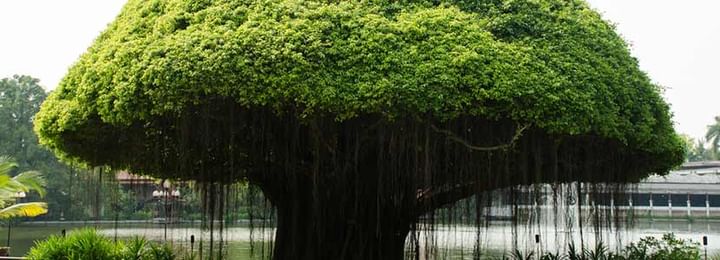Benefits of Banyan Tree And Its Side Effects
Last Updated: Jul 01, 2020
A banyan tree is important to Indian society not only for its religious significance but also for the myriad of health benefits that you can derive from it. It can cure chronic diarrhoea, dysentery and piles. It eases leucorrhoea too. It treats gum and teeth disorders and lowers back and rheumatic pain.
It is also effective against treating female infertility. It also cures ear problems and can be used for the treatment of problems related to hair. Nasal problems, nausea and diabetes can also be cured with it.
Banyan Tree
The most attractive feature of a banyan tree is its ability to survive hundreds of years. It is an evergreen tree that grows in tropical climate and can grow up to 21 metres in height. Besides its religious importance in Hinduism, a banyan tree also features extensively in Ayurveda as it can be used effectively against many ailments. The parts of the banyan tree that are used are aerial root, latex, fruits, buds and leaves.
Nutritional Value of Banyan Tree
A banyan tree contains tons of nutrients . It has B Sitoster, esters, glycosides, leukocyanidin, quercetin, sterols and friedelin. Besides these, it also contains bergapten, flavonoid, galactose, inositol, leucopelar, rutin and tanins. It is also rich in ketones, polysaccharides, sitosterol and toglic acid.
Health Benefits of Banyan Tree
Treats diarrhoea
Taking the small budding leaves and soaking them in water creates a powerful astringent agent that is very good for healing diarhoea, gas, dysentery and irritation of the GI tract.
Prevents tooth decay and gum disease
Taking the aerial roots and chewing on them prevents gum disease, tooth decay and bleeding gums. The aerial roots acts as a natural toothpaste and also helps with bad breath. It also makes the teeth strong. The aerial roots have anti-bacterial and astringent properties which is effective against most oral health problems.
Boosts immunity
A strong immunity is quintessential to having a healthy life. Immunity helps you fight against diseases and protect you from them. The bark of the banyan tree is a good immune boosting agent.
Prevents inflammation
Arthritis and joint pain is associated with inflammation of the joints. This is not only painful but also restrict daily movement. The sap of the banyan leaves have anti-inflammatory properties so it can be helpful against conditions like arthritis.
Prevents depression
Depression is a serious mental condition. Consuming fruits of banyan tree is said to increase the levels of serotonin in the brain thus preventing depression.
Treats vaginal infections
Vaginal infections can happen due to lack of hygiene and because the vagina remains moist. Banyan tree bark as well leaves can treat vaginal infections. Crush a handful of dried banyan leaves to make a tablespoon of powder. Boil this powder in a litre of water until the water reduces to half a litre. Let the infusion cool and then apply on the affected area.
Anti-bacterial and anti-fungal
The bark of a banyan tree contains both anti-bacterial and anti-fungal properties. It controls bacterial and fungal infections.
Lowers cholesterol
There are two types of cholesterol in our body- 'good' and 'bad'. The bark of the banyan tree works great in lowering the bad cholesterol while keeping the good cholesterol level high.
Diabetes
Diabetes is the most common lifestyle disease of modern times. Making an infusion of the roots of the tree is helpful in treating high blood sugar levels.
Treats vomiting
Consuming an infusion of the aerial roots of the tree calms the GI tract. This prevents vomiting.
Uses of Banyan Tree
A banyan tree is important in the Hindu religion. It is profoundly worshipped and revered in India. In Hindu mythology it is believed that banyan tree fulfils wishes and all material and so it has been given the name 'kalpavriksha'. Makeshift swings can be hung from the branches of a banyan tree and so it is a popular area of play for children.
Side-Effects and Allergies of Banyan Tree
There is no such noted adverse effects of using Banyan Tree
Cultivation of Banyan Tree
The banyan tree is native to India and Pakistan. It is intimately incorporated in India's culture, mythology and has been so since ancient times. It is an evergreen plant that grows in tropical and sub-tropical climate in just about any soil. Nowadays banyan trees are grown all around the world in India, the Carribean, Africa and South America.
References
- Ficus benghalensis- Invasive Species Compendium [Internet]. cabi.org. 2018 [Cited 19 June 2019]. Available from:
- Ficus benghalensis- Useful Tropical Plants, Tropical Plants Database, Ken Fern [Internet]. tropical.theferns.info 2019 [Cited 07 August 2019]. Available from:
- Banyan- Feedipedia [Internet]. feedipedia.org. 2010 [Cited 19 June 2019]. Available from:
Table of content
Ask a free question
Get FREE multiple opinions from Doctors



